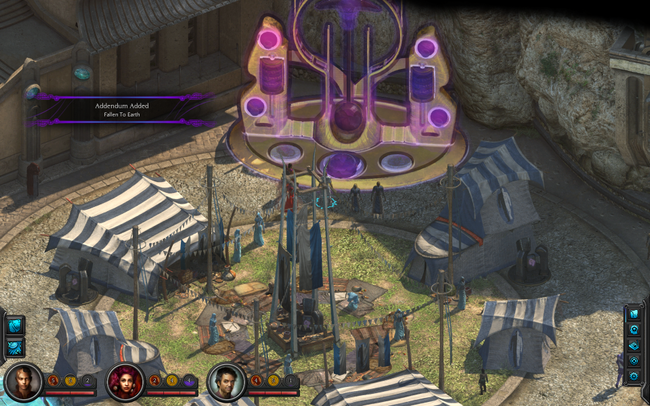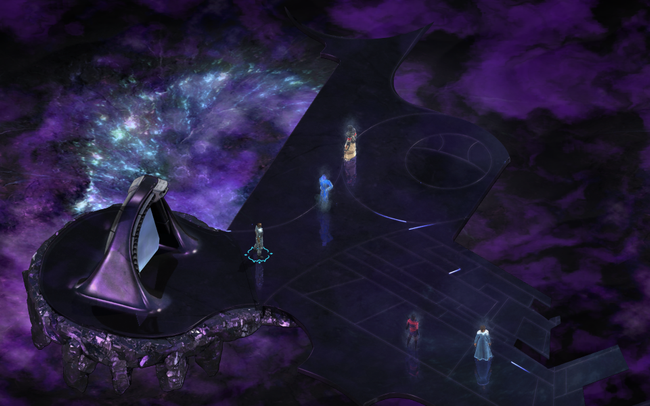Torment: Tides of Numenera Interview: Developing a Modern Cult Classic
Originally expected to deliver in February 2014, Torment: Tides of Numenera has been a long time coming. The spiritual successor to 1999's Planescape: Torment has a tough billing to live up to. We talked to Creative Lead Colin McComb and Designer Thomas Beekers about the history of developing Tides of Numenera and a few things fans should expect from the long awaited followup.
How was the idea of following up on Planescape: Torment born and when was it first apparent that it would be possible using a tool like kickstarter?
[Colin] After the success of the Wasteland 2 Kickstarter, Chris Avellone, Steve Dengler, and I had talked about trying to license Planescape to make a new game back in 2012. Unfortunately (I thought at the time) it didn’t happen. Still, I held out hope. After I started working on Wasteland 2, Brian called me and said he’d registered the Torment trademark, and wanted to know if I’d be interested in helping lead that. I told him the greatest concern I had was that I wouldn’t be equal to making something anywhere close to Planescape: Torment.
After some thought, though, I realized it was something I really, really wanted to do. From there, it was a matter of assembling the early team (Adam Heine, Kevin Saunders, Thomas Beekers, and me), and getting our materials ready for the Kickstarter.

How was it decided that you would use Monte Cook's Numenera universe for the game?
[Colin] I’ve known Monte for well over two decades now, starting from when we worked together at TSR Inc. He asked me to be a part of his alpha testing group for Numenera, and I had a great time. After Brian asked me to be a part of Torment, Adam Heine and I started talking about various story and world ideas, and while our ideas were cool, the direction we were taking was not just an epic world-saving story, but an epic creation-saving story.
We scrapped that and started talking about different worlds we could build, and that’s when I realized that we didn’t need to build our own world. I asked Monte if he’d be interested in licensing, put him in touch with Brian Fargo, and the rest was history.
What would you say sets apart Torment: ToN from other similar titles like Pillars of Eternity, Tyranny, and Divinity Original Sin?
[Thomas] You’re definitely right that there’s a lot tying these games together. Torment is even on the same engine as Pillars of Eternity and Tyranny! There’s a few things that make Torment unique: for one, it’s set on Earth a billion years in the future. It’s a science-fantasy setting where technology replaces the magic of the other games.
And like Planescape: Torment before it, Torment: Tides of Numenera has a unique focus on narrative and literary quality, with a team of talented writers crafting a story of over 1.2 million words. And finally, our approach to combat is also different. We decided to go for fewer combat encounters, but to carefully hand-craft each to be a unique encounter, where players can take very different approaches to them.
Do you feel any sort of extra pressure following up on a cult classic like Planescape: Torment?
[Colin] Oh, naturally. You always want to be respectful when addressing a classic, and if I didn’t think we could have done the original justice with this Torment, I would have withdrawn from the project. We looked at PST carefully to identify what gave it such a strong following, and from that analysis we created the four pillars we used to design the rest of the game around.
What's one hint would you give someone not familiar with Torment or this style of RPGS if they were interested in playing this?
[Thomas] Just one? I guess the main thing would be: don’t instantly reload on failure. One of our design mantras was “Make failure interesting.” Torment accounts for failure in different ways, and sometimes failing or even dying can open up a new path for the player, rather than just be a Call to reload.

How did the decision to release the title on consoles come about? We've seen similar games like Divinity get ported to consoles but Pillars of Eternity (and obviously, Planescape: Torment) are PC exclusive.
[Thomas] It was a decision that came fairly late in the development process – all throughout pre-production and most of production we developed Torment as a PC game. But deep in our development cycle we partnered with Techland Publishing. With their help we made the decision to port the game to Xbox One and PlayStation 4. At that point our production timeline was pretty set, but we also knew localization for the PC game would take months and months, meaning we could work on the console ports while that work was ongoing. It didn’t end up affecting our timeline or development cycle, which was very fortuitous!
Who's was your favorite companion to write, is it the same as your favorite companion to use in game?
[Colin] As a father, I have experience answering this question! I love them all equally, just in different ways. Aligern is the grouchy dad, Matkina is the damaged young adult, Callistege is the groundbreaking explorer, Tybir the suave speaker, Rhin the cautious, questionable child, and Erritis the brash and impulsive youth… they all have their charms, depending on my mood, and they all offer different tactics in game.